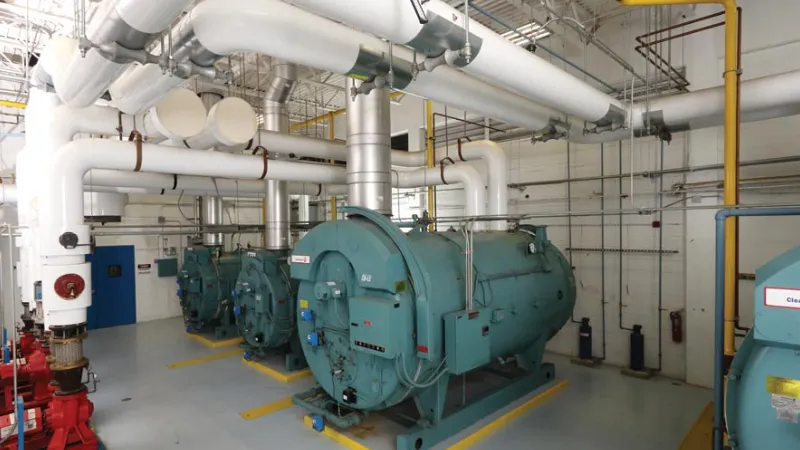In this article, we’ll examine system boilers in detail, highlighting their main advantages and looking at how they operate. We’ll also look at the kinds of properties they suit the best. In the event that a system boiler is not the best option for you, we will also describe which alternatives would be.
In larger homes with higher heating and hot water demand, a system boiler is a type of boiler that is frequently found. By featuring a separate cylinder for storing water, system boilers are able to provide a constant supply of hot water throughout the home, unlike combi boilers which can only heat water on demand.
For more information, keep reading.
What is a System Boiler?
To provide central heating and hot water to our homes, a system boiler collaborates with a hot water cylinder. The boiler heats water directly from the mains to warm up our radiators, and fills the cylinder with boiling water that’s used for our sinks, showers and more.
System boilers use the mains as a heat source, or occasionally bottled gas or oil, to boil the water necessary to keep us warm and comfortable. Larger homes with multiple radiators and bathrooms, which always have a higher demand for hot water, are best suited for system boilers.
A system boiler may be the most practical and cost-effective way to heat your home and water for a family of four or more.
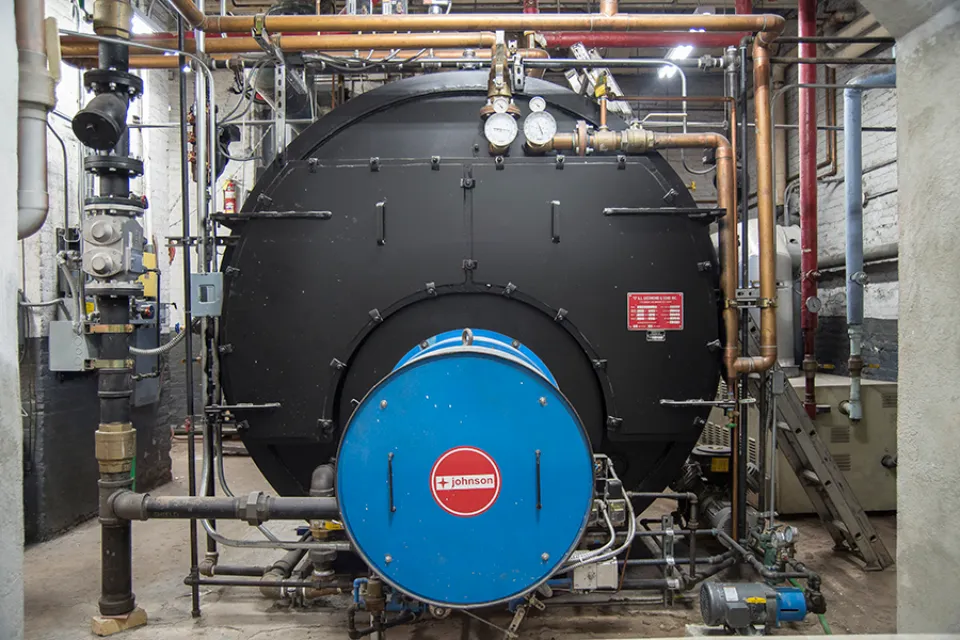
How Does a System Boiler Work?
Let’s examine in more detail how system boilers supply our homes with hot water and central heating.
The process begins in a gas-powered system boiler with the flame heating water in a contained hot water system. Both the hot water cylinder, where it warms the water inside, and the radiators are heated by the hot water being circulated around them.
Electric boilers function exactly the same way as gas boilers, but instead of using a gas flame to heat the circulated water, they use an electric heat exchanger.
In order to heat the hot water cylinder and the radiator system, water in the system is continuously pumped through coils. The water that comes out of the tap is from the cylinder — it never goes near the boiler itself.
Read more:
Is a System Boiler the Same as a Regular Boiler?
System boilers hold several similarities with regular boilers, but also some very important differences.
Regular boilers, also referred to as conventional or heat-only boilers, store hot water for future use similarly to system boilers. They are also found in older, larger homes as a result of this.
The header tank in the loft, also known as the feed and expansion tank, is used to artificially maintain pressure in regular boilers, whereas system boilers use a pressurized heating circuit that is topped off by mains water.
They also use an external expansion vessel to maintain the water pressure, while the expansion vessel is often internal in a system boiler. Regular boilers use more space than a system boiler and often require more complex piping, which is why system boilers are more commonly used in modern properties with multiple bathrooms.
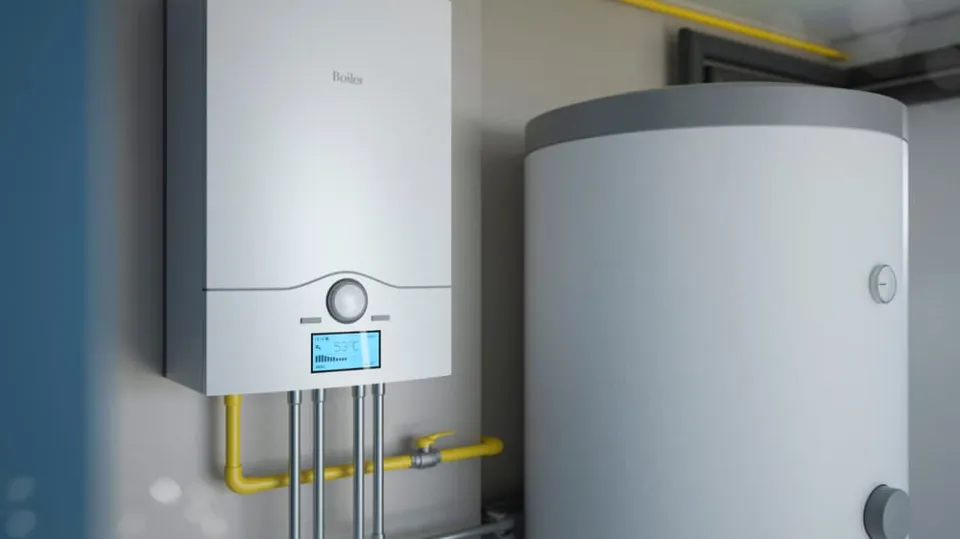
System Boiler Vs Combi Boiler Vs Regular Boiler
In addition to the system boiler, which is the star of this show, there are two alternatives types of boiler:
System Boiler
In that they deliver hot water directly to the central heating and store it in a hot water cylinder, system boilers are very similar to regular (conventional) boilers.
They do, however, differ in that they do not need as much storage space because their water is provided directly from the mains water supply. It also means they deliver water at high pressure, so provide a more consistent flow rate.
Regular Boiler
Also known as a conventional boiler which is similar to a system boiler but requires an additional cold water storage tank (usually in your loft) which acts as the water supply as opposed to the mains – meaning a lesser water pressure and less room in your attic for dead bodies or prisoners.
Combi Boiler
The most well-liked and, in most cases, most effective boiler in the UK, it gives your radiators instant access to hot water and heats them without the need for cylinders or water tanks. It is a boiler’s dream.
The only downside of a combi is that if it does break down, your home will have no heating, and no hot water. An immersion heater is not available as a backup.
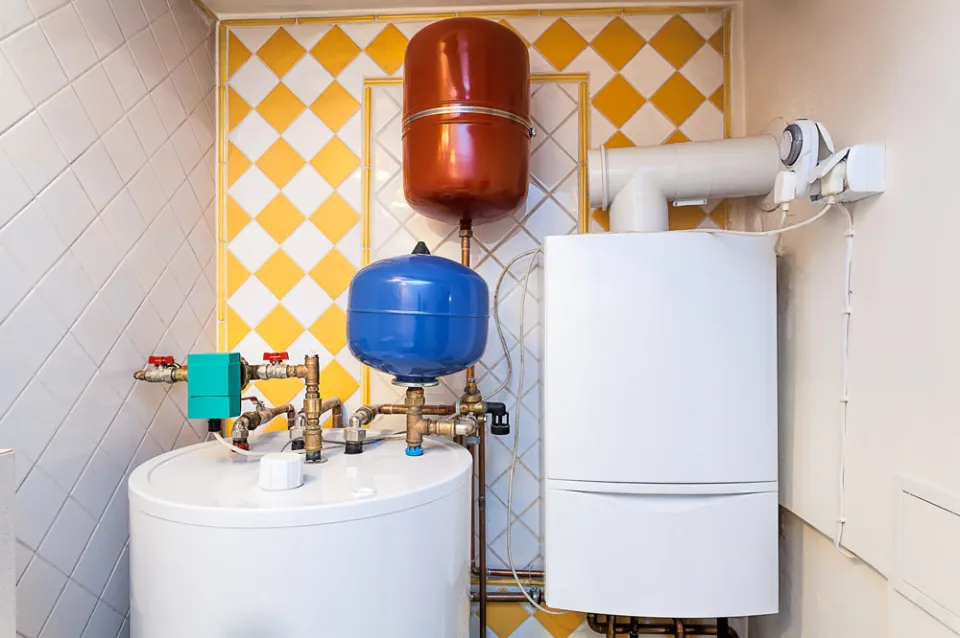
How Much Do System Boilers Cost?
A system boiler can range in price from $500 to $2,000 depending on the model, size, and manufacturer.
For middle-of-the-road residences with marginally higher energy demands than residences with 1-2 bedrooms, an entry-level boiler is a good option. For homes with significant heating needs, premium models, which can cost up to £1500, are a great option.
If you’re interested in having a system boiler installed, we have a range of Which? Best Buy awarded system boilers available. Talk to a local Vaillant expert in your area to find the perfect solution for you.
Pros of a System Boiler
- They can handle high hot water demand with ease
Never evaluate a book by its cover.
The beast in your airing cupboard may seem like an unsightly waste of space, but it will allow many members of your household to use hot water simultaneously thanks to its large capacity and long-lasting heat.
- Quick to heat your house and eco friendly
The insulated water storage cylinder is an affordable way to provide hot water to a number of outlets and relentlessly showering family members, and a water pump within system boilers allows for incredibly quick delivery of water to your radiators.
- Harvest the power of the sun
Water storage cylinders and tanks of regular and system boilers can be heated through solar panels after installation. Soak it in.
- Improved water pressure over a regular boiler
System boilers use the mains water supply when delivering water to your hot water outlets which provides improved water pressure. This contrasts with a conventional boiler, which slackly relies on gravity to create pressure while using water from a filthy tank in your attic that contains dead birds.
Additional loft space over a regular boiler
In contrast to regular boilers, which essentially require the installation of a steel bathtub in your attic space, a system boiler only needs a water cylinder, which can be concealed invisibly in your airing cupboard to deter burglars who have heard you arrive home early.
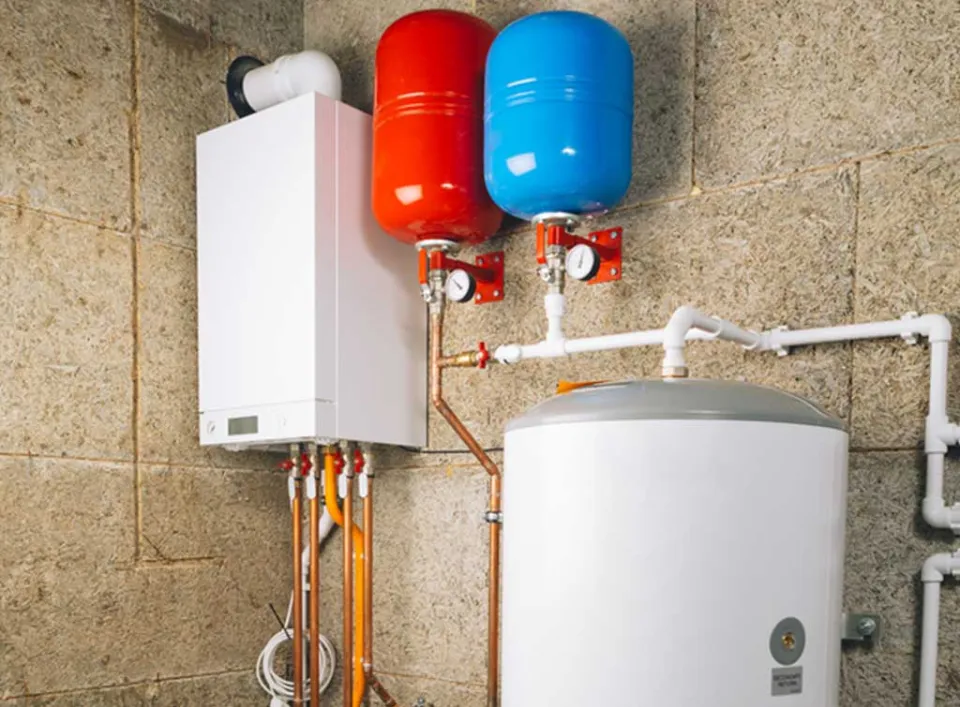
Cons of a System Boiler
- Saint-like patience required – a lack of instant hot water
System boilers heat a large amount of hot water (in the cylinder) relatively slowly which means if your boiler has been switched off for a significant amount of time, you’re waiting for that water to be heated from cold which could well test your patience.
- System boilers use more space than combi boilers
Being the sole component, a combi boiler has many advantages. System boilers require an additional water cylinder that is going to take up space somewhere in your home, most likely an airing cupboard. You could store golf clubs, wine, or misbehaving children in that space.
Water cylinders come in a variety of sizes but not really many different shapes. You might have a small cylinder and experience insufficient hot water supply, or you might have an oversized cylinder and have to wait for the water to heat up while you watch an entire season of The Sopranos.
Points to Bear in Mind
More Space Needed Than a Combi Boiler
While they take up less space than a standard boiler, system boilers naturally require more space than combi boilers because of the hot water cylinder, which must be taken into account in smaller homes.
Busier Times May Require a Little Patience
Although your cylinder should have been sized to handle your typical usage (typically around 50 liters of stored hot water per person), there may be times when usage is higher than usual, such as when you have a lot of guests staying, Christmas time, etc. During these periods, the cylinder volume may be exhausted, resulting in a 30- to 40-minute delay before the boiler can reheat the cylinder once more.
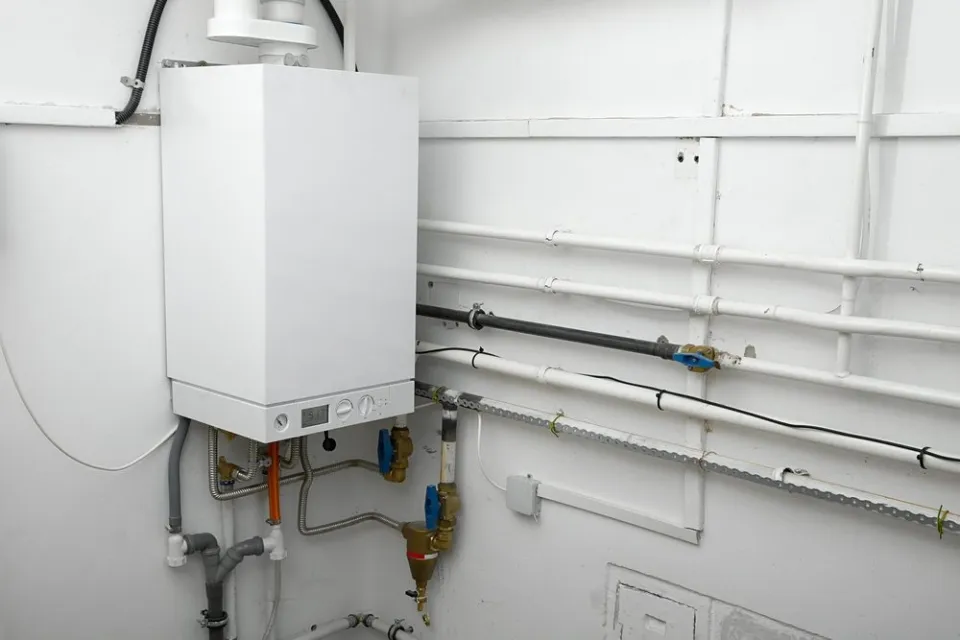
Does a System Boiler Need to Be on for Hot Water?
Neither the radiator system nor the hot water system is in operation 24/7. Utilizing thermostats and timers, they are turned on and off automatically. The system will stop boiling water if there is no demand for hot water or hot radiators. You can conserve energy by having a valve stop the water flow to the other one if there is only demand for one of them.
The majority of households have their system boilers set to begin warming the water in the cylinder early in the morning. There is a cylinder full of piping hot water available to draw from by the time the residents awaken and need to wash, take a bath, or take a shower. Once the hot water is used up, however, the process of heating the cylinder will have to start all over again, which is why you’ll have to wait if you want more hot water.
System boilers typically use mains water pressure to make hot water flow from the faucet. The bottom of the cylinder is where cold water enters, and the top is where hot water is drawn. If water is used more quickly than it can reheat (i.e. if you run a bath or two), the water will go cold and you’ll need to wait for it to reheat before you get more hot water.
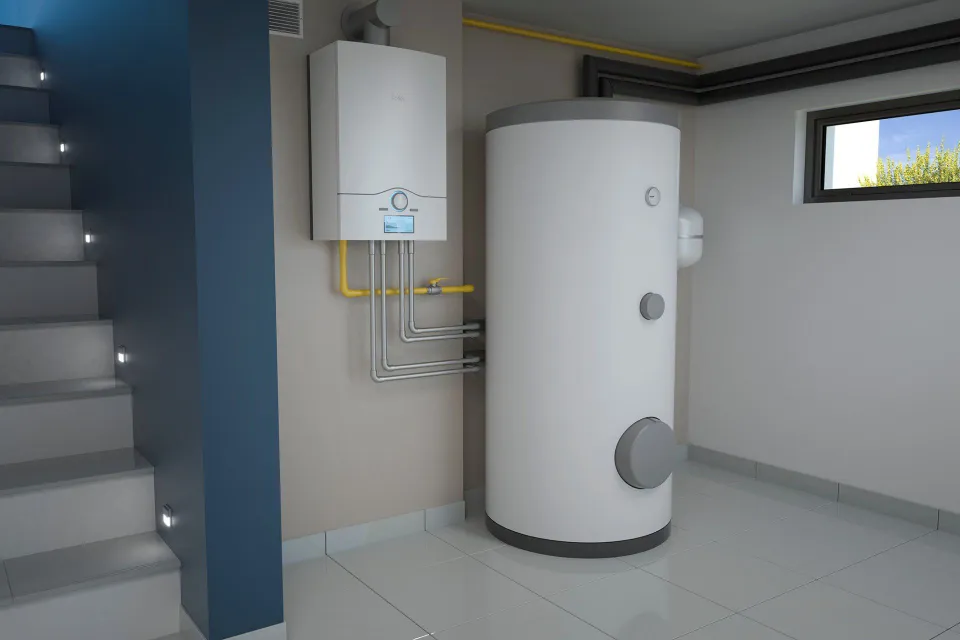
FAQs
What is the Difference Between a System Boiler and a Regular Boiler?
A system boiler is a sealed system that only needs a boiler and a cylinder, whereas a regular boiler might also need header tanks in the attic to feed the hot water cylinder and keep the radiators’ water levels constant.
What is the Difference Between a System Boiler and a Combi Boiler?
A Combi boiler provides both heating and hot water instantly. A system boiler is designed to work with a cylinder to provide hot water as it does not have the hot water heat exchanger. Because of the expansion vessel and pump it has, the boiler can be installed in a sealed system.
Is System Boiler Better Than Regular?
System boilers can be more efficient than other models because of the high water demand they provide. The ability to pair these boilers with solar-powered panels to make your home more environmentally friendly is another fantastic feature of these appliances.
What Do I Need for a System Boiler?
The system draws its water directly from the public water supply. This implies that, unlike with a conventional boiler, you do not require a water tank in your loft. All you need for a system boiler is your boiler unit and a storage tank which can usually be housed in an airing cupboard.
Is a System Boiler More Expensive Than a Regular Boiler?
System boilers are more difficult because they contain some of the parts needed for an unvented system. This means that they are more expensive than regular boilers, and they will also take up more space when they are installed.
Summary: What is a System Boiler?
The system boiler is a kind of boiler, which is usually found in large families with large demand for heating and hot water. Contrary to combined boilers, which can only heat water when it is needed, system boilers can supply hot water continuously for the entire family by using a separate water storage tank.
If you have any questions, please leave a comment. My Prime Home tries to give you the best home improvement information. Don’t forget to share the post. Thank you for reading.
